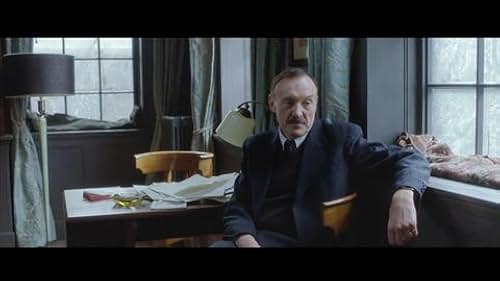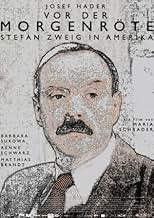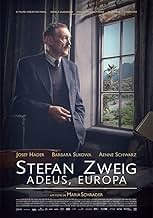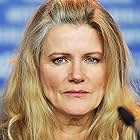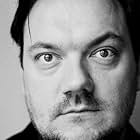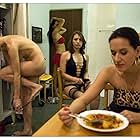IMDb RATING
6.7/10
2.7K
YOUR RATING
Before Dawn charts the years of exile in the life of famous Jewish Austrian writer Stefan Zweig, his inner struggle for the "right attitude" toward the events in war torn Europe, and his sea... Read allBefore Dawn charts the years of exile in the life of famous Jewish Austrian writer Stefan Zweig, his inner struggle for the "right attitude" toward the events in war torn Europe, and his search for a new home.Before Dawn charts the years of exile in the life of famous Jewish Austrian writer Stefan Zweig, his inner struggle for the "right attitude" toward the events in war torn Europe, and his search for a new home.
- Awards
- 6 wins & 10 nominations
- Director
- Writers
- All cast & crew
- Production, box office & more at IMDbPro
Storyline
Did you know
- TriviaOfficial submission of Austria for the 'Best Foreign Language Film' category of the 89th Academy Awards in 2017.
- ConnectionsFeatured in Women Make Film: A New Road Movie Through Cinema (2018)
- SoundtracksThe Blue Danube Waltz
Composed by Johann Strauss
Featured review
'Stefan Zweig: Farewell to Europe' is a movie which, although a good one, left me slightly unsatisfied. I was interested, at times impressed, at others amused by Maria Schrader's film, but in the end, not totally conquered.
* Interested because Zweig is among my favorite writers and my being given the opportunity to revisit his life and ideas (even if in a restricted manner like here) could not possibly leave me indifferent. Moreover the cast, composed of Austrian, German and Portuguese actors, is chosen to perfection. Josef Hader embodies the great writer most convincingly and Barbara Sukowa as Friderika, his ex-wife, is her usual competent self. As for Aenne Schwarz, she reveals an engaging personality as Lotte, Stefan's second wife. * Impressed by the virtuosity of director Schrader (the dazzling opening sequence set at the Jockey Club ; the closing one leaving the vision of Zweig and Lotte's dead bodies off-camera except for a transient reflection in the mirror of a wardrobe). * Amused by the indescribable humor of the long sequence staging the botched reception of Stefan and Lotte in a remote village of Bahia State, the plump henpecked mayor delivering a clumsy address under the control of his domineering wife, followed by the harrowing performance of a local brass band striking up to play one of the worst versions of "The Blue Danube" ever to be heard. A comical episode but in no way gratuitous insofar as it reinforces the notion that Zweig is in awkward position, at once fascinated by his adopted country and lost in deep, irremediable uprooting.
So what accounts for the slight feeling of insatisfaction that was mine after viewing the film: too many speeches perhaps (what is indeed less humane than these exercises in rhetoric convincing only the convinced and leaving the others listening distractedly and yawning discreetly ?); the narrative process chosen (Zweig's life from 1936 to 1942 presented in five barely related episodes and an epilogue) not allowing to know Zweig intimately enough? For example, I would have liked to know on what grounds Zweig had divorced Friderika, how he formed a new couple with Lotte, how Stefan persuaded Lotte to follow him in death... I dare say that to avoid being accused of making a merely illustrative biopic told in chronological order (the critics' latest pet aversion), some filmmakers tend to uselessly break down temporality. This is precisely what, in my case, lessened the emotional impact of this otherwise thought-provoking film. A little more continuity would have resulted in a little more adherence to the story and its characters, a must-be when one deals with such a connoisseur of the human soul as Zweig.
But those are only reservations, not a rejection of the movie. Even with what I consider its shortcomings (not everybody's point of view for that matter, 'Stefan Zweig: Farewell to Europe' remains a respectable work, which will not make you waste your time.
* Interested because Zweig is among my favorite writers and my being given the opportunity to revisit his life and ideas (even if in a restricted manner like here) could not possibly leave me indifferent. Moreover the cast, composed of Austrian, German and Portuguese actors, is chosen to perfection. Josef Hader embodies the great writer most convincingly and Barbara Sukowa as Friderika, his ex-wife, is her usual competent self. As for Aenne Schwarz, she reveals an engaging personality as Lotte, Stefan's second wife. * Impressed by the virtuosity of director Schrader (the dazzling opening sequence set at the Jockey Club ; the closing one leaving the vision of Zweig and Lotte's dead bodies off-camera except for a transient reflection in the mirror of a wardrobe). * Amused by the indescribable humor of the long sequence staging the botched reception of Stefan and Lotte in a remote village of Bahia State, the plump henpecked mayor delivering a clumsy address under the control of his domineering wife, followed by the harrowing performance of a local brass band striking up to play one of the worst versions of "The Blue Danube" ever to be heard. A comical episode but in no way gratuitous insofar as it reinforces the notion that Zweig is in awkward position, at once fascinated by his adopted country and lost in deep, irremediable uprooting.
So what accounts for the slight feeling of insatisfaction that was mine after viewing the film: too many speeches perhaps (what is indeed less humane than these exercises in rhetoric convincing only the convinced and leaving the others listening distractedly and yawning discreetly ?); the narrative process chosen (Zweig's life from 1936 to 1942 presented in five barely related episodes and an epilogue) not allowing to know Zweig intimately enough? For example, I would have liked to know on what grounds Zweig had divorced Friderika, how he formed a new couple with Lotte, how Stefan persuaded Lotte to follow him in death... I dare say that to avoid being accused of making a merely illustrative biopic told in chronological order (the critics' latest pet aversion), some filmmakers tend to uselessly break down temporality. This is precisely what, in my case, lessened the emotional impact of this otherwise thought-provoking film. A little more continuity would have resulted in a little more adherence to the story and its characters, a must-be when one deals with such a connoisseur of the human soul as Zweig.
But those are only reservations, not a rejection of the movie. Even with what I consider its shortcomings (not everybody's point of view for that matter, 'Stefan Zweig: Farewell to Europe' remains a respectable work, which will not make you waste your time.
- guy-bellinger
- Oct 8, 2016
- Permalink
- How long is Stefan Zweig: Farewell to Europe?Powered by Alexa
Details
- Release date
- Countries of origin
- Official site
- Languages
- Also known as
- Trước Bình Minh
- Filming locations
- São Tomé e Príncipe(Bahia, Brazil)
- Production companies
- See more company credits at IMDbPro
Box office
- Gross US & Canada
- $78,372
- Opening weekend US & Canada
- $11,729
- May 14, 2017
- Gross worldwide
- $1,370,772
- Runtime1 hour 46 minutes
- Color
- Aspect ratio
- 2:39
Contribute to this page
Suggest an edit or add missing content

Top Gap
By what name was Stefan Zweig: Farewell to Europe (2016) officially released in Canada in English?
Answer
